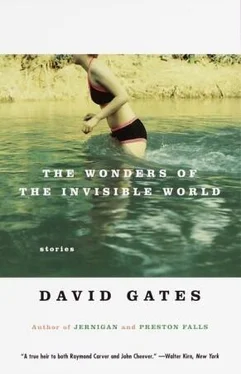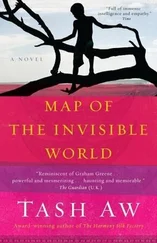The story I always tell about Wylie — always told — is the time we went to Alice’s brother’s house down in Taunton for Christmas. Herb had married a Roman Catholic girl, and nothing would do but we had to go to their Christmas Eve mass. Well, when we got into the church, they had the biggest crucifix you ever saw hanging over the altar. The Christ wasn’t quite life-sized, but it must have been a good three or four feet long, with skin the color of a Band-Aid and a white-painted loincloth. The eyes wide open on it. Believe you me, Wylie’s eyes opened pretty wide, too: we, of course, had just the plain gold cross in our church. “Mommy?” she said, loud enough for everybody in the place to hear. “How come he’s got diapers on?” To this day, Wylie hates to have that one told on her, though it’s a perfectly harmless story.
These days I wear a diaper.
The story I never tell about Wylie is this. One afternoon I surprised her and the little neighbor girl behind the garage, both of them with their pants down. (This was at our house in Woburn.) I can still remember that little girl’s name, Myra Meyers. Speaking of names somebody ought to have thought twice about. I sent her about her business, then grabbed Wylie by the arm and marched her right inside and whaled the living daylights out of her. These days, of course, they say you’re not accountable: that you are what you are and not what you make up your mind to be. That it’s all genetic — drinkers, too, like myself, or the mail lady’s husband. That you’re helpless to change yourself and certainly can’t do anything for anybody else and never mind what God tells us in His word. Well, I believe I changed Wylie that day. Or at least helped her on toward the life she has now, with a husband (though not someone we might have chosen for her) and about to begin a family (however late). And away from — the old-fashioned word is abominations, but I’ll say abnormalities. (My own theory is, that’s what’s wrong with the mail lady, children or no children.) I don’t imagine Wylie realizes to this day — if she ever thinks of it — that each stroke burned with my love for her. But the day is coming when all that is hidden shall be revealed.
When I think back about the first great intervention in my life (I count my shock as the second), I’m ashamed to remember how long I tried to hold out. I first sought the conventional remedy for a man of my background and education. One takes one’s child to see Fantasia, one dreams that night of the devil, one’s terror does not abate the next morning, nor the next, nor the next. After two weeks of this, one scurries to a psychiatrist. To whom one is induced to complain about one’s own childhood. One is talked around into trying to believe that one had such and such feelings about one’s father and mother: the so-called family romance. (Oh, yes, I know the jargon.) It is pointed out that the word abate is in itself a not insignificant choice. The terror still does not abate.
Then one has a quote unquote chance encounter with a friend who quote unquote just happens to be a Christian.
This was a fellow named John Milliken, whom I’d known when we were both graduate students at Stanford. He actually took his Ph.D.; I’d had to leave and go back to New England when my father died. The little money Alice made at the library was barely enough for the two of us, and now there was Mother to think of. Eventually I was lucky enough to catch on with what was then a scrappy new company (a shoestring operation in those days, right after the war), willing to hire a young chemist without an advanced degree. Well, Milliken, to make a long story short, ended up working for an outfit we did business with and living just over in Arlington. So he and I would get together two or three times over the course of a year. We might have seen more of each other, but I was a new father and he was a bachelor. And Alice never warmed up to him, before or after.
One Saturday night, probably a month into my troubles, he and I sat late in the bar of the old Parker House and I opened up to him. Alice by this time had taken the baby and gone to stay with Herb and Evelyn in Taunton; we were not calling it a separation. Desperate as I was, I would hardly have told Milliken about it had I not been drinking. In fact, I was hoping he’d call it a night so I could slip over to Scollay Square, to a certain bar I had discovered and wanted to know more about. (The thought of which terrifies me to this day.) But Milliken kept sitting there, nursing his one Manhattan, nodding, putting in a word or two. More or less, I’m bound to say, in the manner of the doctor I’d been seeing. Though more kindly.
“Well, Lew,” he said, when I told him about my dream and the terror that wasn’t going away, “has it occurred to you to take this thing seriously?”
“What the Christ do you think I’m doing?” I said.
He shook his head. “Why don’t I swing by your house tomorrow morning. I’ve got the hangover cure to end all hangover cures. Are you all right to drive, by the way?”
I was not. The room, in fact, looked tilted and seemed to be going silent. I was not all right to live.
“I think you’d best let me drop you,” he said. “We can always pick up your car tomorrow. Unless you’re afraid to be by yourself tonight. In which case, I’ve a fold-out sofa you’re welcome to.”
Years later, when I read C. S. Lewis — so often a help to me, and I wish I had the strength of mind to read him now — I was struck by what he said about his conversion. I believe I still have it by heart. When we set out —he was riding to the zoo in London in the sidecar of somebody’s motorcycle— I did not believe that Jesus Christ was the Son of God, and when we reached the zoo I did. That’s what it was like, riding to John Milliken’s house. True, he did begin to pray aloud as we were passing over the Longfellow Bridge, with its stone towers like a castle keep. But around me it was quiet, and the faraway tune his voice was making seemed to blend in with something else that was happening. Out Main Street we flew and onto Massachusetts Avenue, and the people on the sidewalks seemed to pass each other in comradely fashion, like the angels in Jacob’s dream — a thing I hadn’t thought about since I was a boy in Sunday school — moving up and down the ladder that reached from earth to heaven. They began to be surrounded by a pulsing radiance, and I thought I saw some of them passing right through others. It didn’t strike me as out of the ordinary. I looked over at John Milliken: his profile glowed along its edge from hairline to Adam’s apple; light frosted his eyebrows. His lips were moving. I looked at his hands, gripping the wheel, his bulging knuckles imperfectly mirroring the wheel’s knuckled underside, a patch of hair on the top of each finger. I closed my eyes, and sounds rushed back in: the rubbery, rapid-fire whapping of tire treads on pavement, John Milliken’s voice saying And in Jesus Christ’s name we something something something, a sweet-toned car horn off somewhere. When I opened my eyes again, there we were: just a couple of fellows in a car heading out Massachusetts Avenue.
But the whole point of Jacob’s dream, as I now understand it, is that it’s a dream. The door between this world and the spiritual world has closed, I have come to believe, and will remain so until heaven and earth shall be made new. This is where I part company not just with the Wylies of the world, but with the John Millikens. I soon shied away from the so-called spirit-filled church he brought me to that morning, where grown men and women stood blinking and babbling in no language, and he and I lost touch. He must be an old man now. I ended up with the Baptists — imagine what Great Grandfather Coley would say to that! — and have mostly felt at home there. With the doctrine if not always with the people.
Читать дальше












